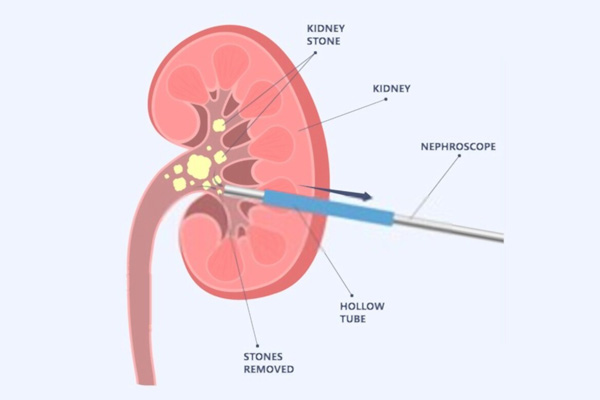Percutaneous Nephrolithotomy (PCNL)
Overview
At Indotaj Medical Center in Tajikistan, we offer percutaneous nephrolithotomy (PNL), a specialized procedure designed to address kidney stones that cannot pass on their own.
“Percutaneous” signifies that the procedure is performed through the skin. This technique involves creating a pathway from the skin on the back to the kidney. Skilled surgeons at our medical center utilize specialized instruments passed through a small tube in the back to locate and extract stones from the kidney.
Percutaneous nephrolithotomy is particularly employed for larger stones or situations where less-invasive methods prove ineffective or are not feasible. Our medical professionals prioritize patient comfort and employ advanced techniques to ensure the successful removal of kidney stones, contributing to improved urological health.

Why it's done
Staghorn Kidney Stones: PNL may be advised when large kidney stones block multiple branches of the collecting system, commonly referred to as staghorn kidney stones.
Stone Size: The procedure is suitable for kidney stones larger than 0.8 inch (2 centimeters) in diameter.
Ureteral Stones: PNL is considered when large stones are present in the tube connecting a kidney and the bladder, known as the ureter.
Failed Alternative Therapies: When other therapeutic interventions have proven unsuccessful, percutaneous nephrolithotomy becomes a viable and effective option at our medical center.
Risk
- Bleeding
- Infection
- Injury to the kidney or other organs
- Incomplete stone removal
How do I get ready for coronary artery bypass surgery?
Urine and Blood Tests: These tests aim to identify any signs of infection or other potential issues. Blood tests assess your overall health, while urine tests provide insights into kidney function. Additionally, a computerized tomography (CT) scan will be performed to precisely locate the kidney stones.
Pre-Procedure Instructions: You may receive instructions to refrain from eating and drinking after midnight on the night before your scheduled procedure. It is crucial to follow these guidelines for optimal preparation.
Medication and Supplement Review: Inform your care team about all medications, vitamins, and dietary supplements you are currently taking. Depending on the case, adjustments may be recommended, and certain medications may need to be temporarily halted before the surgery.
Antibiotic Prescription: Your surgeon may prescribe antibiotics as a precautionary measure to minimize the risk of post-procedural infections.


